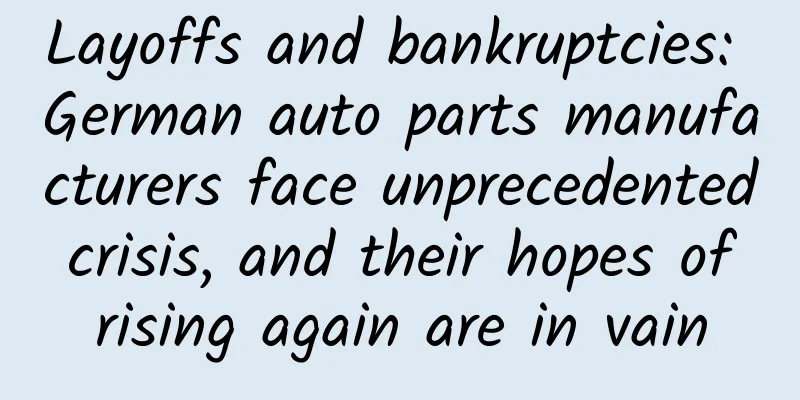Layoffs and bankruptcies: German auto parts manufacturers face unprecedented crisis, and their hopes of rising again are in vain

|
When a whale falls, everything comes to life. But the fall of a whale in the automotive industry does not necessarily bring life. Currently, the global automotive industry is in a critical period of transformation from "oil" to "electricity". This is a switch in the automotive ecosystem. All species that depend on this system will have to "survive the catastrophe" that cannot be avoided. Component manufacturers are the first to be affected by the dramatic change in oil and electricity. According to statistics from German authorities, in the first half of this year, 20 German auto parts suppliers with annual revenue of more than 10 million euros went bankrupt, a 60% increase year-on-year. Those industry giants that have not gone bankrupt are also struggling to survive. ZF recently announced that it will lay off 11,000 to 14,000 employees in Germany by the end of 2028, accounting for about 25% of the total number of employees. This is a big move. Continental, another German auto parts giant, is more radical, and its global business is beginning to be affected. In February this year, it planned to lay off 7,150 employees, accounting for 3.6% of its global workforce, and it was required to be completed by the end of 2025. Bosch Group said at the end of last year that it would lay off at least 1,500 employees at its two transmission factories in Germany, and planned to lay off about 1,200 employees in its software and electronics departments by the end of 2026. The drastic changes that the German auto parts industry, which had flourished for a century, encountered did not happen overnight. As early as 2020, 28 auto parts suppliers in Germany had been hit by the first wave of industry shocks and filed for bankruptcy; the Russia-Ukraine issue that broke out in early 2022 brought a severe energy crisis to Germany. The automotive industry was naturally the first to be hit, and even Porsche's high-quality supplier Allgaeurs declared bankruptcy. China, the United States and the European Union are major automobile hubs in the world. Germany, as the leader of the EU economy, is also the pillar of the EU automobile industry. If the German automobile industry is sluggish, the entire EU will suffer. In December 2023, Germany's new car sales fell by about 25%, and electric car sales plummeted by 48%, dragging down EU new car sales by 3.8% year-on-year, marking the first decline in 17 months. The slowdown in demand has dragged down the parts suppliers that rely on automakers. In the three years from 2021 to 2023, global auto sales will be 5%, -0.1% and 11.9% respectively, reaching 92.72 million vehicles in 2023. These figures seem good, but they have not returned to the peak level before 2020. In addition, there is another important reason why global auto sales can achieve an increase of more than 10% in 2023, and that is the increase in demand in China. China's passenger car market sales reached 26.063 million units last year, a year-on-year increase of 10.6%; if commercial vehicles are included, the sales volume reached 30 million units, a year-on-year increase of 12%. This is the first time that China's automobile sales have exceeded the 30 million mark. In other words, China alone contributes about 30% of the global growth, but German auto parts suppliers may not be able to get much of this super big cake. Chinese auto parts manufacturers are rising rapidly, quickly grabbing market share from Continental, Bosch, ZF and other manufacturers. Compared with these foreign manufacturers, Chinese auto parts manufacturers have localization advantages and more flexible pricing strategies. In addition, China's auto sales growth is mainly driven by new energy vehicle sales, but the increase brought by new energy vehicles is also not seen by German auto parts manufacturers. The global new energy sales champion is BYD, with annual sales of 3 million vehicles. However, BYD, like Toyota, is a "vertically integrated" company, with batteries, chips, motors and other components basically supplied internally. Another electric car giant, Tesla, mainly purchases components from local Chinese manufacturers. Currently, the "localization rate" of Tesla's models produced in China is almost 100%, and almost all orders are given to domestic manufacturers. If it was just the sales of fuel vehicles that were shrinking, Continental, Bosch, ZF and other manufacturers might not be so miserable and could survive. But the problem is that after losing the Chinese market, it is unlikely that fuel vehicles will rebound as a whole. The core components needed for electric vehicles are batteries, motors, electronic controls, laser radars, high-definition cameras, high-end chips, etc., while German parts manufacturers such as ZF can only provide the old three: engines, gearboxes, chassis, etc. For German parts manufacturers, their products are out of touch with market demand. Taking power batteries as an example, the two giants BYD and CATL together account for more than half of the global power battery market share, and their advantage is almost unshakable; in terms of lidar, China also has big bosses like Hesai Technology, a manufacturer that accounts for 30% of the global share. Of course, German auto parts manufacturers will not sit idly by. They are laying off employees to save money and invest more resources in the new energy field. But the problem is that if they want to get a piece of the pie in the new energy era, they need two conditions: strong market demand and first-class technology. They do not have these two conditions for the time being. In the first six months of this year, global sales of new energy vehicles reached 1.4 million units, a year-on-year increase of 13%. China alone contributed 860,000 units, accounting for about 65% of the global market share. In other words, there is market demand for new energy vehicles, but not in the European market. In fact, since the second half of last year, the growth rate of new energy vehicle sales in Europe has slowed down significantly. From January to June this year, the EU new energy vehicle market share was only 13.9%, which is less than that in 2023. Electric vehicles are a new thing, but the growth rate has begun to slow down, which is definitely not a good thing. Obviously, their internal interests are not well balanced, which has triggered the traditional art of "policy swing" in the EU. So, is focusing on the Chinese market a solution? In fact, it is not very feasible. Again, it’s too late. This is not only because we already have our own strong supply chain, but also because Germany’s relevant technical reserves are obviously insufficient. For example, even to this day, the EU has not cultivated a large-scale power battery manufacturer. In the era of fuel vehicles, ZF's gearbox and Bosch's motor were the selling points of a car; but in the era of new energy, they can no longer find their place. Because of the strength of the automobile industry, Germany was able to rise from the ruins even after two disasters, but this time it was different, because they did not lose to their opponents, but to themselves and the times. Thinking back, they need not only an opportunity, but also a solid industrial fulcrum. There is really not much time left for the German automotive industry. As a winner of Toutiao's Qingyun Plan and Baijiahao's Bai+ Plan, the 2019 Baidu Digital Author of the Year, the Baijiahao's Most Popular Author in the Technology Field, the 2019 Sogou Technology and Culture Author, and the 2021 Baijiahao Quarterly Influential Creator, he has won many awards, including the 2013 Sohu Best Industry Media Person, the 2015 China New Media Entrepreneurship Competition Beijing Third Place, the 2015 Guangmang Experience Award, the 2015 China New Media Entrepreneurship Competition Finals Third Place, and the 2018 Baidu Dynamic Annual Powerful Celebrity. |
>>: Behind Google's "100 million times faster": How is quantum computing achieved?
Recommend
Taking shopping mall activities as an example, analyze how to carry out offline activities!
It's really a coincidence that these days, va...
How did LeTV Cast break the deadlock in mobile-TV interoperability behind the surge in tens of millions of users?
“One does not know how expensive firewood and ric...
Cortana UI is like this now, why don’t you chat with it?
Hey, Cortana: Your mission is to make your daily ...
How do the old men in the park master the secret of whipping at supersonic speeds?
Everyone must be familiar with whips. They can be...
How did goldfish, which originated in China, go global?
3,000 years ago, Chinese people began to raise fi...
The versatile "Lynx Car" can be equipped with various weapons and can also be transformed into an ultra-light all-terrain cooking vehicle
As a country known for its delicious food, my cou...
Which company has the best technology for mini program development? Which company is better for developing mini-programs in China?
Which company has the best technology for mini pr...
What are the functions of the cooking app? How much does it cost to develop a home cooking app?
Nowadays, many young people do not know how to co...
Analysis of Pinduoduo’s group purchasing model!
The essence of group buying is that multiple user...
Nokia doesn’t need to be replaced for five years, iPhone is used for an average of three years, what about the Android camp?
If there is any product that has completely chang...
Hubble Telescope captures the scene of star creation! It is only 160,000 light-years away from us
The Hubble Space Telescope captured this view of ...
Is it expensive to produce the Yongzhou Glasses Mini Program? Yongzhou glasses applet production cost
The factors affecting the quotation of Yongzhou G...
Context-Menu.Android
Source code introduction Screenshot of excellent ...
Resembling "Hot Wheels", the Nomin River volcano group "appeared on camera"!
The Nuominhe volcanic group in the Oroqen Autonom...
How to attract traffic and monetize through WeChat red envelope covers?
Today I want to ask you a few questions, and you ...









